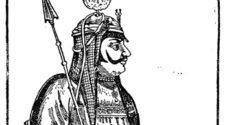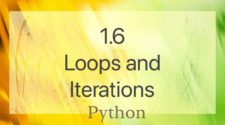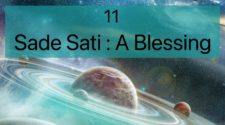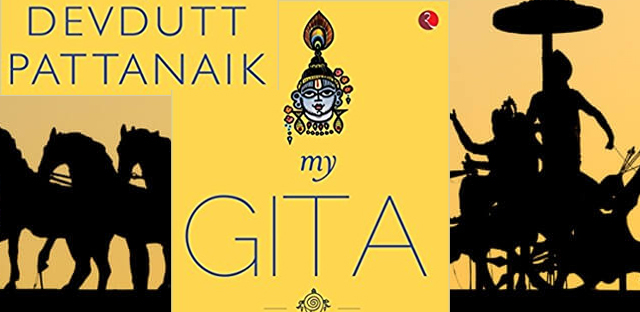The first three chapters were quite informative however chapter four struck a chord. Chapter four dwells on the idea of what are we or what is the definition of us
Introducing us to the concepts of dehi, deha, prakriti, purusha the weaves an idea around these concepts.
Innately or because of being brought up in a cultural setting (India), we have an idea about ‘atma’ and this idea mostly revolves around mechanisms of re-birth.
This chapter refines these ideas and improves our understanding of terms that we use as a habit without understanding the linguistic and conceptual backbone.
For example, ‘Bhaga’ is a slice and ‘Bhaga-van’ is one who experiences every slice of reality. Similarly the idea that we are a ‘jeev’ or self is a ‘jeev-atma’, whereas the other (para), person or animal becomes a ‘para-atma’. And all of it constitutes ‘param-atma’. The linguistic transition for ‘para’ (other) to ‘param’ (supreme) is subtle yet relevant.
Similarly, ‘guna’ is property, and if we can measure it, it is tangible, hence ‘sa-guna’ and when we can’t measure it (nir) it is ‘nir-guna’. Thus ‘Nir-Guna’ is not without property, it is just that the properties are not measurable.
Essentially the philosophy of Gita is that everything has a property, be it animals, plants, rocks, rivers etc.

This note reminds me of Dalai Lama. When asked why Tibet was suffering and why it was under subjugation, his serene reply was that the nation of Tibet has a ‘karma’, every nation has a ‘karma’ and this contributes to rise and fall in the history of the nation in accordance to it’s ‘karma’.
Now we think of nation as fundamentally a human creation, borders drawn on land or a map. However Dalai Lama defined nation as a spirit, as an independent entity. This is a much powerful concept than just a line on a map, because you can conquer a nation, destroy its boundaries, enslave its people, yet the ‘idea’ of a nation does not perish. An idea does not require a physical presence as long it resides as an idea. Like the idea of Ancient Egypt, the Pharaohs, the nile etc.
In the chapter the next interesting thing elaborated is the concept of ‘Dehi’.
‘Deha’ is the body and flesh, the exterior and ‘Dehi’ is that which resides within the ‘Deha’. Akin to a soul but much more than the traditional definition of a soul. The idea of ‘dehi’ expands beyond the standard understanding of consciousness
The ‘dehi’ is essentially ‘nir-guna’, not tangible, not measured. We have to rely on a more intuitive argument to understand the concept. It’s exact identity is elusive to define, it might be the mind, the intelligence, the consciousness, the imagination. essentially ‘something’/ It cannot be defined, but it exists.
 ‘But it exists’, this statement is in the same vein of René Descartes saying ‘I think, therefore I am’ (Discourse on the Method, 1637). He elaborates that I might be human, or I might be a brain receiving chemical impulses in a jar or a recent example could be that I might be a character in a computer simulation. Regardless of the ‘form’ (human, brain in a jar, computer simulation) I am in, there is something which is ‘me’ and that cannot be denied. In context of the chapter, the ‘Deha’ may be disputed, its form and existence could be disputed, however that existence of ‘dehi’ is undeniable.
‘But it exists’, this statement is in the same vein of René Descartes saying ‘I think, therefore I am’ (Discourse on the Method, 1637). He elaborates that I might be human, or I might be a brain receiving chemical impulses in a jar or a recent example could be that I might be a character in a computer simulation. Regardless of the ‘form’ (human, brain in a jar, computer simulation) I am in, there is something which is ‘me’ and that cannot be denied. In context of the chapter, the ‘Deha’ may be disputed, its form and existence could be disputed, however that existence of ‘dehi’ is undeniable.
The Upanishads describe a five container structure. Our breath resides in our flesh, our mind resides in our breath, our concepts reside in our mind, and our emotions reside in our concepts. We can then sense the emotions by the way they are expressed through our body and our breath.
By implication, a two way connection runs through the structure, our emotions can in turn shape our concepts and even our sensory experience.
This idea is worth exploring. Recently an experiment was conducted where a picture of a model was taken and was given to graphic artists from different parts of the world. These artists took the same picture, photoshopped it, with the objective of making it ‘Beautiful’. The result was supposed to be a lesson in how cultural ideas shape personal ideas of ‘beauty’ as each artist came with a totally different image in the end.
This begs the question whether ‘beauty’ is an innate idea?
It is that, something inherently beautiful relays itself through our senses and reaches our mind and gets identified as beautiful?
OR
Is it that we already have a concept of beauty and we will navigate until a sensory experience matches our concept of beauty?
The result of the experiment favors the latter explanation
So the idea of some ‘universal beauty’ might be farcical in its concept. Can there be a prose, a poem, accepted by everyone as ‘beautiful’?
It is we humans that assign ‘attribute’ to a particular entity. It is the process of assigning meaning to that which is around us. It is a process of seeking meaning for ourselves through assigning meaning to things around us.
What is our purpose?
We need to add meaning to our existence. If this inner desire to have meaning is accepted then it links to our concept of ‘dehi’. ‘Dehi’ is assigning meaning to ourselves and our surroundings. This very process creates meaning in this world (Prakriti). Meaning is thus subjective and yet the idea of ‘meaning’ is not tangible, not measurable. This meaning that we create does not die with us.
 In a strange way this idea of meaning beyond death reminds me of the movie ‘Coco’. In a poignant moment a character defines death as not the moment when we leave our body and flesh. Instead we truly die when we do not live even as a memory with others. Our memories with others, is our meaning, which stays even after physical death.
In a strange way this idea of meaning beyond death reminds me of the movie ‘Coco’. In a poignant moment a character defines death as not the moment when we leave our body and flesh. Instead we truly die when we do not live even as a memory with others. Our memories with others, is our meaning, which stays even after physical death.
How important is ‘meaning’. Is it important for the ‘dehi? it maybe important, it certainly serves to give direction for living a good life. However the text visualizes a collective. The collective or ‘Prakriti’ collects individual meaning and creates collective meaning, collective knowledge. This makes the ‘dehi’ immortal, infinite, because like the memory with others, the meaning created by the ‘dehi’ stays with the ‘Prakriti’. Thus if ‘Prakriti’ infinite, the ‘dehi’ becomes part of this infinite by contributing meaning to the infinite.
It can be a tranquil experience, to have the conceptual clarity of contributing and becoming part of the infinite.
The equation of re-birth can be added to this concept, as a mechanism of enriching the ‘dehi’ with meaning contributed coming to fruition in the next life or incarnation. However re-brith is not an essential concept to establish immortality. Without re-birth, immortality is achieved by the meaning which stays in the infinite.
Contrary to this idea, the idea of infinite can also cultivate a view of ‘futility’. Because if the premise of infinite is accepted then adding meaning to the infinite does not change anything. It keeps the infinite as infinite!. Thus pursuing meaning is ultimately futile!
The futility conclusion can also be drawn through another route. The ‘dehi’ through meaning might feel fulfilled yet in larger scheme of things it is futile as A] It is too small to change anything (earlier argument) or B] If we take re-birth out of the equation, then for the ‘dehi’ it is futile beyond its own ‘existence’ as the ‘dehi’ will never be able to experience the fruits of its contribution.
This idea of Futility is very dangerous because it can have dire consequences. It may lead to extreme destruction (nothing matters, it is futile, so destroy everything) or it may lead to extreme self-harm (my life does not matter in the larger scheme, so destroy it)
Thus the ideas around meaning have ‘utility’. The idea of re-birth has ‘utility’. They prevent the world from becoming a dangerous place, keeping things ‘sane’.
This could be the reason that Gandhi pushed for selfless pursuit of meaning and purpose rather than take a selfish view of pursuing meaning for one’s own enrichment. Selfless pursuit takes away the problem of futility for the person during existence, and establishing that the greater good will be achieved in the future (beyond existence) takes away the problem of thinking about future utility. It is about keeping faith, utilitarian faith!.

Read the review of Coco (Movie) click here














Keep on working, great job!
I have read so many posts on the topic of the blogger lovers but this paragraph is truly
a nice post, keep it up.